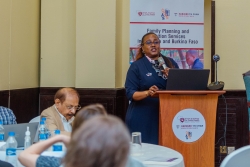
This research is done independently in Tanzania and Burkina Faso as part of the ARISE Network and representatives of countries in Sub-Sahara Africa (SSA). The initiative in Tanzania is crucial, focusing on the intersection of family planning and nutrition services for women of reproductive age (15-49 years). With over 70% of the population in Tanzania under 30 years old and nearly 50% under 18 years, 47.3% of the female population falls within the reproductive age bracket, highlighting the vulnerability of this group to nutritional complications during pregnancy, such as anaemia.
The study aims to review, synthesize, and compare policies and programs related to family planning and nutrition in Tanzania and Burkina Faso by the end of 2022. The emphasis is on identifying trends, gaps, and best practices in these areas. The study employs an exploratory cross-sectional qualitative approach, divided into two phases that will be conducted separately in each country. The first phase comprises desk review of policies and programs around family planning and nutrition and the second phase is about stakeholders engagement. However, the phases can overlap and are interlinked such that one phase can contribute to the other as more themes and patterns emerge.
In Tanzania, Phase I involved analysis of desk reviews of 26 policies and programs, utilizing the Walt and Gilson framework for health policy and systems research. This phase seeks to provide a comprehensive overview of existing policies, strengths, weaknesses, and areas for improvement in family planning and nutrition services.
Phase II engaged key stakeholders through Key Informant Interviews and focus group discussions. This approach aims to gather insights into the perspectives on the benefits, challenges, barriers, and opportunities related to the integration of family planning and nutrition services. Thematic analysis will be employed to interpret patterns and themes identified in the qualitative data, leading to the development of a narrative that captures the essence of the findings.
The anticipated outcome of this study is comprehensive, offering insights into the strengths and weaknesses of family planning and nutrition policies in Tanzania. It aims to identify opportunities for integration, ultimately informing future decision-making in these crucial areas. On the other hand, outcomes of the study in Burkina Faso will provide a picture of how these barriers and challenges to integration compare and contrast across Sub-Sahara African countries. The researchers hope that these findings will contribute to the empowerment of women of reproductive age, leading to improved health outcomes and socio-economic benefits for both individuals and the community. The study aligns with a broader goal of enhancing well-being of women and influencing positive change through informed decision-making.
